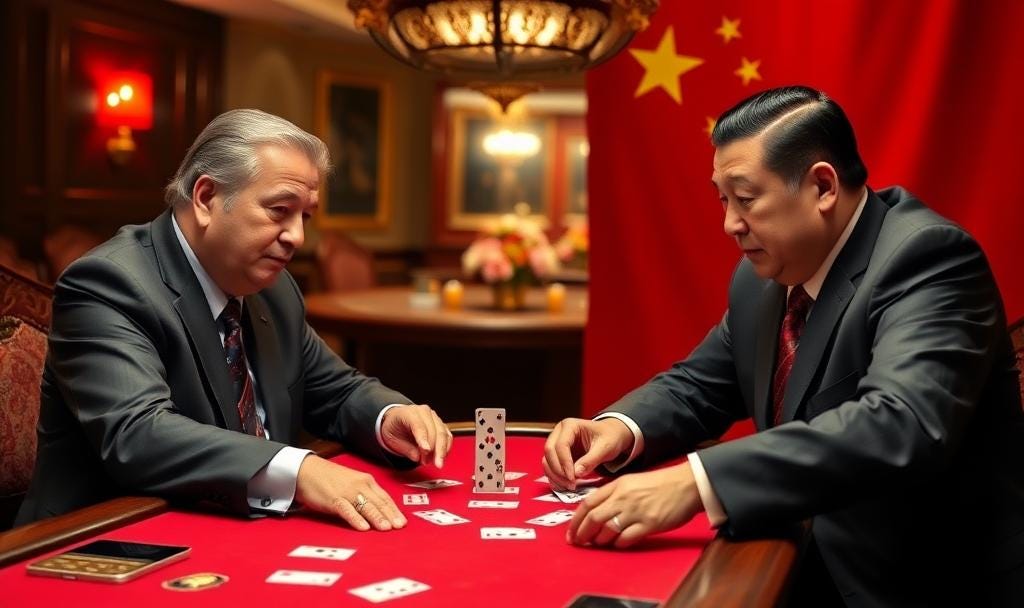China Overplays Its Hand on Export Controls
"New International Order" Begins to Look Eerily Familiar
The current transition to “multipolar” global order is limited in its scope primarily because there is no means by which the international system can fundamentally change. The United Nations was at its birth an energetic institution which is now given to feckless bureaucracy and “consensus building”, while institutions like the World Trade Organization and the International Monetary Fund, or even regional associations like the European Union, lack the centralized power and cultural coherence necessary to institute changes in global regimes.
Only individual states of sufficient power can mold and shape global affairs. China and Russia are beginning to influence them on a larger scale, but not to the extent of the United States, and the attempt to suggest an alternative order has taken a hit by the institution of extensive export controls on rare earth metals, not only requesting approval of what they are used for, but also who the end-product of their usage is exported to.
This is unprecedented because, historically, export controls have only applied to discrete goods, not to an extensive supply chain. The United States limited the export of semiconductors to the Soviet Union in the early days of the technology, and while workarounds were found, the Soviets never restricted - for instance - the entire titanium supply chain which, through CIA cutouts, was used to develop and mass produce the F-14 (the most advanced fighter jet of its time).
Vladimir Putin, last year, suggested restrictions on the export of uranium, titanium and nickel in order to pressure the West into sanctions relief, but this was never pursued further (at least not in an obvious manner), presumably because commodities markets are quit responsive to supply shortages and inflation. Put more simply, you don’t necessarily want to raise the price of something that’s replaceable (e.g. requiring limited technical expertise), because the cure for high prices is typically high prices - markets and capital respond to extract or substitute goods that have been restricted without much hesitation, as there are likely a slew of guaranteed buyers.
That is not to say rare earths do not require technical expertise and lead time to extract and refine, but it is hardly as complex as the lithography and manufacturing processes which go into advanced chips - something which China has worked hard to substitute since the US imposed export controls there in 2018.
And therein lies “the rub”. If China persists in this policy, it can impose short term pain on the United States and its Western consiglieres, but in that short term it will have also encouraged the development of parallel supply chains. One could say that the United States already had an intention of building these supply chains - the Pentagon took a strategic stake in MP Materials (a North American rare earths producer) earlier this year and just announced a new $1 billion stockpile of critical minerals - but while it is likely that China’s recent actions have only encourage the inevitable, the issue is that they have also accelerated it, which undermines their strategic position more rapidly than is otherwise necessary.
Hence, this policy is a failure, both upon announcement as well as if it’s ever rescinded. Few expected China to be this outwardly aggressive, and it shows that China’s soft talk towards a more collaborative and mutually beneficial international system is not meant simply to exclude the United States, but actually vests them with the power (in their view) to withhold critical minerals from anyone they disagree with as well as anyone producing goods for consumption by those they disagree with - hardly a “collaborative” international trade regime.
Now, hot of the heels of an apparent coup de grace in the “restoring of Peace in the Middle East”, Trump is in a historic position to punish China, which with its partner Russia was not effective in generating a peace (hint: they do not have enough influence over Israel), while Russia has resisted ovations for peace (despite their often impractical nature), and while Trump can now impose export restrictions on critical discrete goods like Boeing parts, where China has no meaningful substitute (as the Reuters article points out) because China’s parallel to Boeing - COMAC - has struggled to deliver 5 of the 32 expected production passenger jets it planned this year.
In this circumstance, there are more things that sound too good to be true - firstly that China can produce any meaningful number of its vaunted 6th generation fighters when it cannot, after decades of investment, produce a meaningful number of passenger jets, and secondly, that because of their efforts to substitute Boeing, fewer than 5% of Boeing’s order book tracks back to China, meaning that Trump can impose new restriction at effectively no cost.
Whether nations should be committed to international trade or not is something which can be debated, but what nations should not do is claim to be committed to international trade when they only enjoy its more mercantilist habits and indulgences. This is where the US under Trump has become less hypocritical as an international actor than China - Trump is honest about his intentions. He seeks Autarky, he wants everything that can be produced domestically to be produced domestically. This imposes broader costs and inefficiencies within the international system, but worse yet for China, Autarky is fantastic, until other people start doing it.


